HI6005 Management & Organisations in a Global Environment Report
VerifiedAdded on 2023/06/13
|8
|1599
|489
Discussion Board Post
AI Summary
This paper analyses Fordism and Taylorism, focusing on productivity enhancements and worker satisfaction, and explores Thomas Friedman's perspective on globalisation, particularly the concept of a 'flat world' and its implications. It discusses the benefits and drawbacks of Taylorism, its presence in modern workplaces like call centers, and the uneven nature of globalisation's impact worldwide. The paper concludes that while Taylorism has contributed to productivity, its effects on worker satisfaction are questionable, and globalisation's benefits are not uniformly distributed, leading to ethical and practical challenges for businesses.
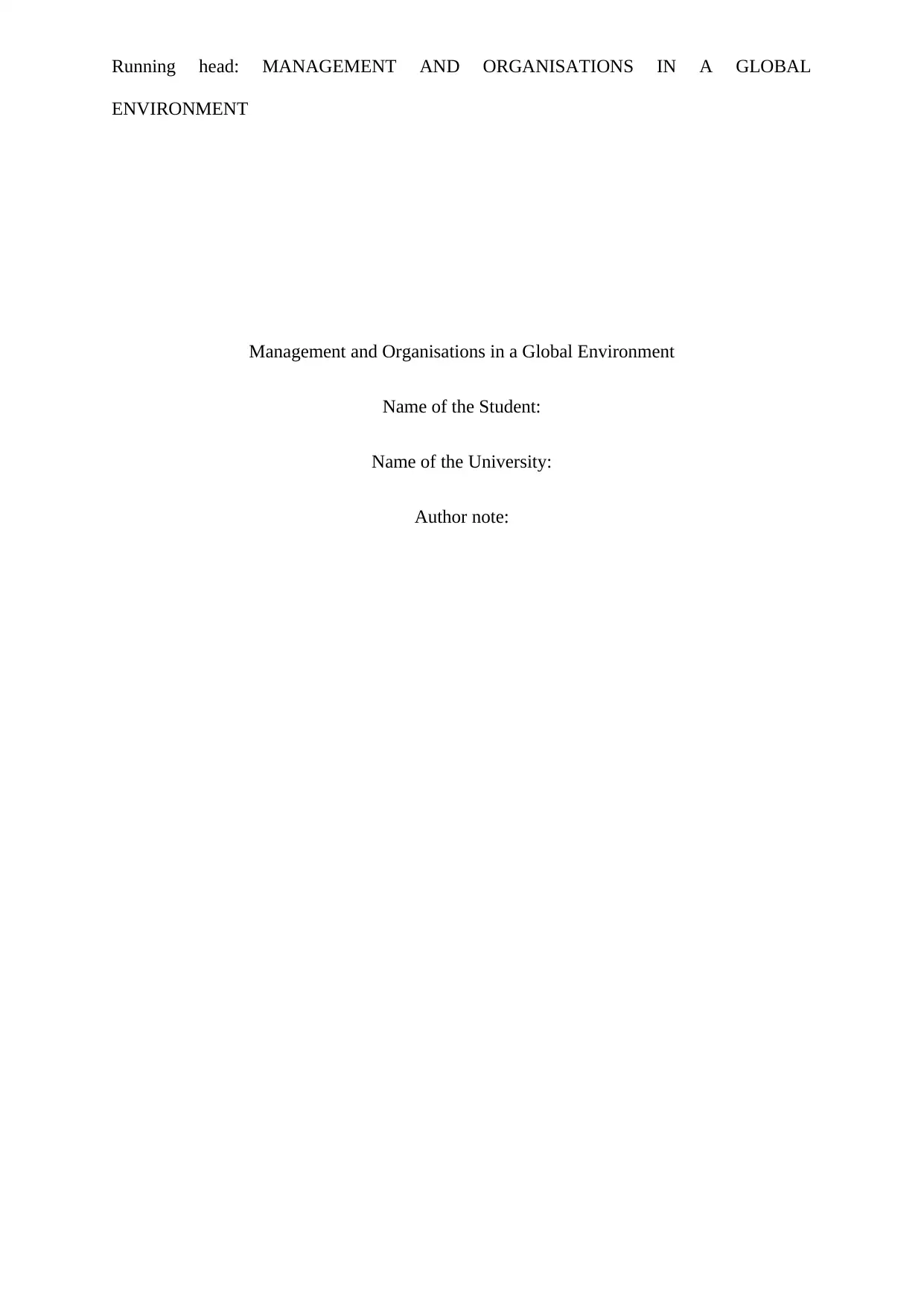
Running head: MANAGEMENT AND ORGANISATIONS IN A GLOBAL
ENVIRONMENT
Management and Organisations in a Global Environment
Name of the Student:
Name of the University:
Author note:
ENVIRONMENT
Management and Organisations in a Global Environment
Name of the Student:
Name of the University:
Author note:
Paraphrase This Document
Need a fresh take? Get an instant paraphrase of this document with our AI Paraphraser
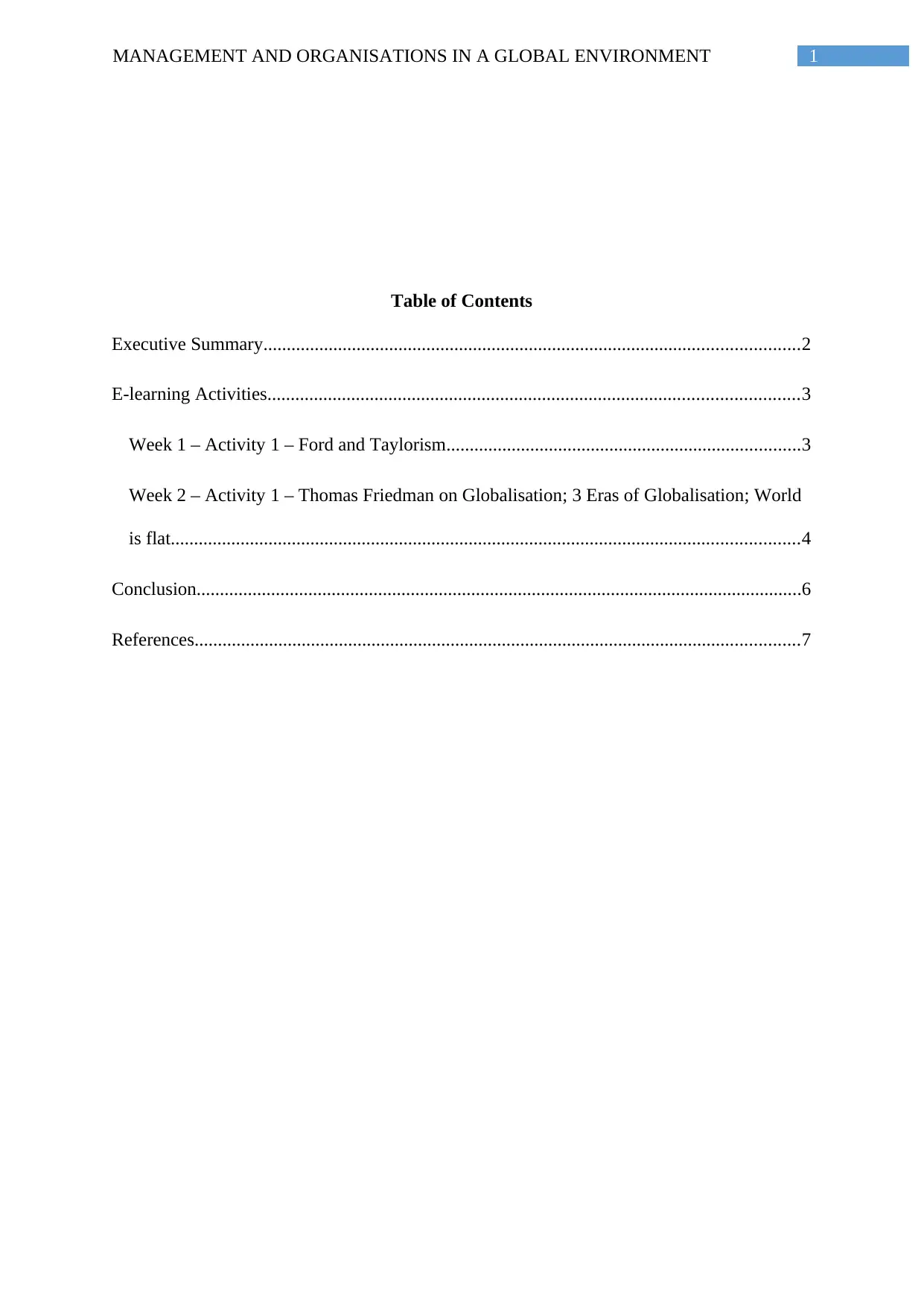
1MANAGEMENT AND ORGANISATIONS IN A GLOBAL ENVIRONMENT
Table of Contents
Executive Summary...................................................................................................................2
E-learning Activities..................................................................................................................3
Week 1 – Activity 1 – Ford and Taylorism............................................................................3
Week 2 – Activity 1 – Thomas Friedman on Globalisation; 3 Eras of Globalisation; World
is flat.......................................................................................................................................4
Conclusion..................................................................................................................................6
References..................................................................................................................................7
Table of Contents
Executive Summary...................................................................................................................2
E-learning Activities..................................................................................................................3
Week 1 – Activity 1 – Ford and Taylorism............................................................................3
Week 2 – Activity 1 – Thomas Friedman on Globalisation; 3 Eras of Globalisation; World
is flat.......................................................................................................................................4
Conclusion..................................................................................................................................6
References..................................................................................................................................7
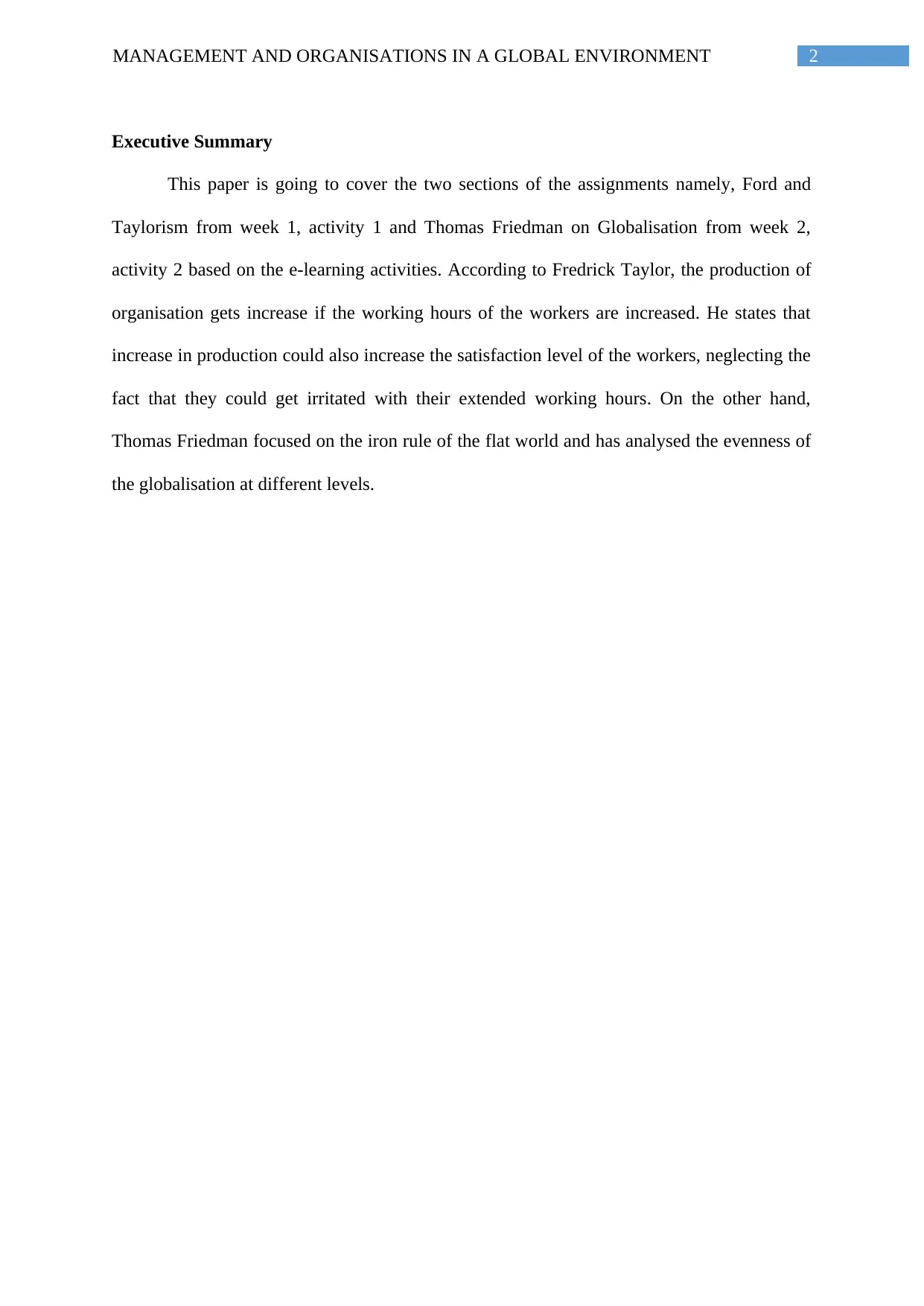
2MANAGEMENT AND ORGANISATIONS IN A GLOBAL ENVIRONMENT
Executive Summary
This paper is going to cover the two sections of the assignments namely, Ford and
Taylorism from week 1, activity 1 and Thomas Friedman on Globalisation from week 2,
activity 2 based on the e-learning activities. According to Fredrick Taylor, the production of
organisation gets increase if the working hours of the workers are increased. He states that
increase in production could also increase the satisfaction level of the workers, neglecting the
fact that they could get irritated with their extended working hours. On the other hand,
Thomas Friedman focused on the iron rule of the flat world and has analysed the evenness of
the globalisation at different levels.
Executive Summary
This paper is going to cover the two sections of the assignments namely, Ford and
Taylorism from week 1, activity 1 and Thomas Friedman on Globalisation from week 2,
activity 2 based on the e-learning activities. According to Fredrick Taylor, the production of
organisation gets increase if the working hours of the workers are increased. He states that
increase in production could also increase the satisfaction level of the workers, neglecting the
fact that they could get irritated with their extended working hours. On the other hand,
Thomas Friedman focused on the iron rule of the flat world and has analysed the evenness of
the globalisation at different levels.
⊘ This is a preview!⊘
Do you want full access?
Subscribe today to unlock all pages.

Trusted by 1+ million students worldwide
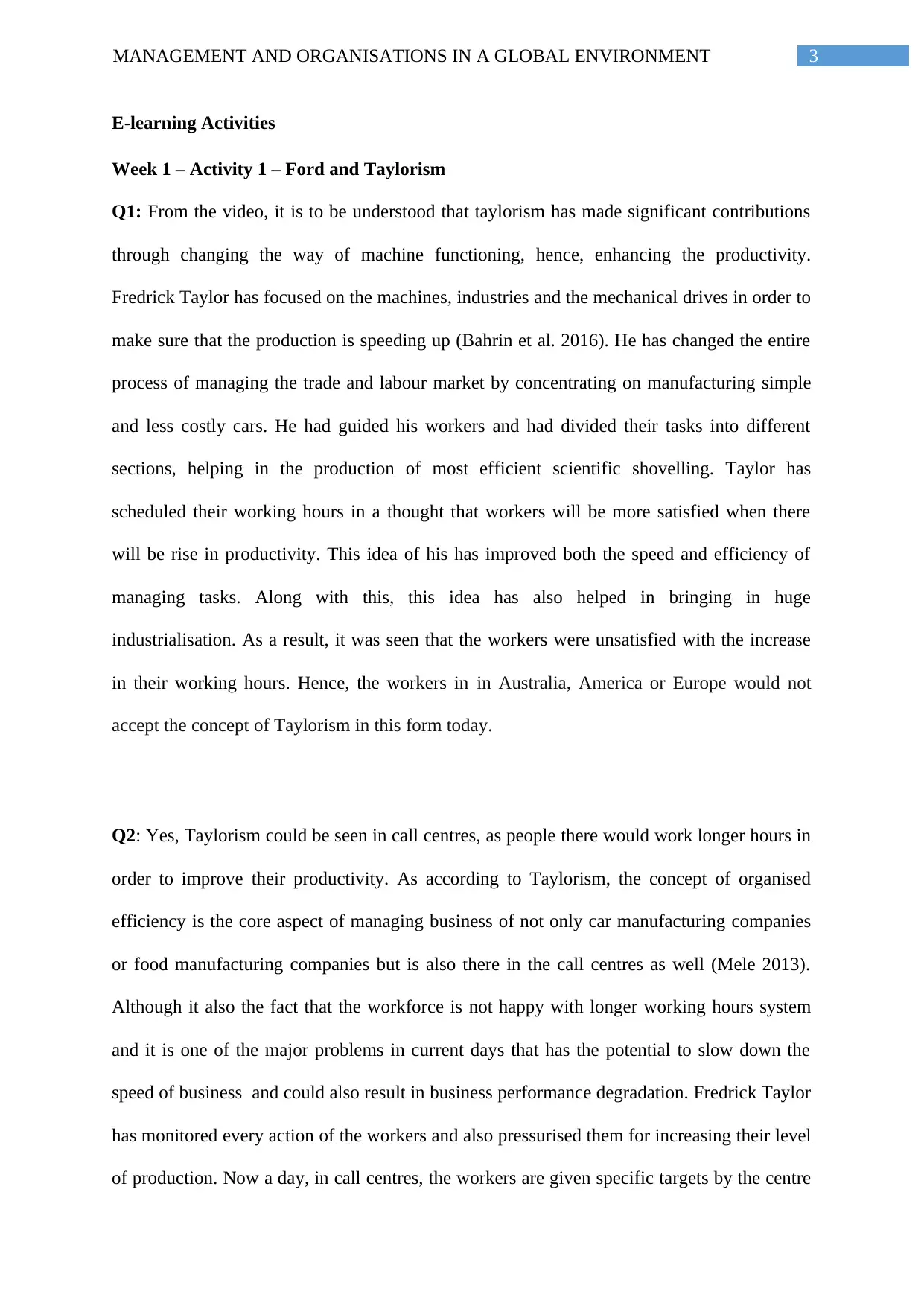
3MANAGEMENT AND ORGANISATIONS IN A GLOBAL ENVIRONMENT
E-learning Activities
Week 1 – Activity 1 – Ford and Taylorism
Q1: From the video, it is to be understood that taylorism has made significant contributions
through changing the way of machine functioning, hence, enhancing the productivity.
Fredrick Taylor has focused on the machines, industries and the mechanical drives in order to
make sure that the production is speeding up (Bahrin et al. 2016). He has changed the entire
process of managing the trade and labour market by concentrating on manufacturing simple
and less costly cars. He had guided his workers and had divided their tasks into different
sections, helping in the production of most efficient scientific shovelling. Taylor has
scheduled their working hours in a thought that workers will be more satisfied when there
will be rise in productivity. This idea of his has improved both the speed and efficiency of
managing tasks. Along with this, this idea has also helped in bringing in huge
industrialisation. As a result, it was seen that the workers were unsatisfied with the increase
in their working hours. Hence, the workers in in Australia, America or Europe would not
accept the concept of Taylorism in this form today.
Q2: Yes, Taylorism could be seen in call centres, as people there would work longer hours in
order to improve their productivity. As according to Taylorism, the concept of organised
efficiency is the core aspect of managing business of not only car manufacturing companies
or food manufacturing companies but is also there in the call centres as well (Mele 2013).
Although it also the fact that the workforce is not happy with longer working hours system
and it is one of the major problems in current days that has the potential to slow down the
speed of business and could also result in business performance degradation. Fredrick Taylor
has monitored every action of the workers and also pressurised them for increasing their level
of production. Now a day, in call centres, the workers are given specific targets by the centre
E-learning Activities
Week 1 – Activity 1 – Ford and Taylorism
Q1: From the video, it is to be understood that taylorism has made significant contributions
through changing the way of machine functioning, hence, enhancing the productivity.
Fredrick Taylor has focused on the machines, industries and the mechanical drives in order to
make sure that the production is speeding up (Bahrin et al. 2016). He has changed the entire
process of managing the trade and labour market by concentrating on manufacturing simple
and less costly cars. He had guided his workers and had divided their tasks into different
sections, helping in the production of most efficient scientific shovelling. Taylor has
scheduled their working hours in a thought that workers will be more satisfied when there
will be rise in productivity. This idea of his has improved both the speed and efficiency of
managing tasks. Along with this, this idea has also helped in bringing in huge
industrialisation. As a result, it was seen that the workers were unsatisfied with the increase
in their working hours. Hence, the workers in in Australia, America or Europe would not
accept the concept of Taylorism in this form today.
Q2: Yes, Taylorism could be seen in call centres, as people there would work longer hours in
order to improve their productivity. As according to Taylorism, the concept of organised
efficiency is the core aspect of managing business of not only car manufacturing companies
or food manufacturing companies but is also there in the call centres as well (Mele 2013).
Although it also the fact that the workforce is not happy with longer working hours system
and it is one of the major problems in current days that has the potential to slow down the
speed of business and could also result in business performance degradation. Fredrick Taylor
has monitored every action of the workers and also pressurised them for increasing their level
of production. Now a day, in call centres, the workers are given specific targets by the centre
Paraphrase This Document
Need a fresh take? Get an instant paraphrase of this document with our AI Paraphraser
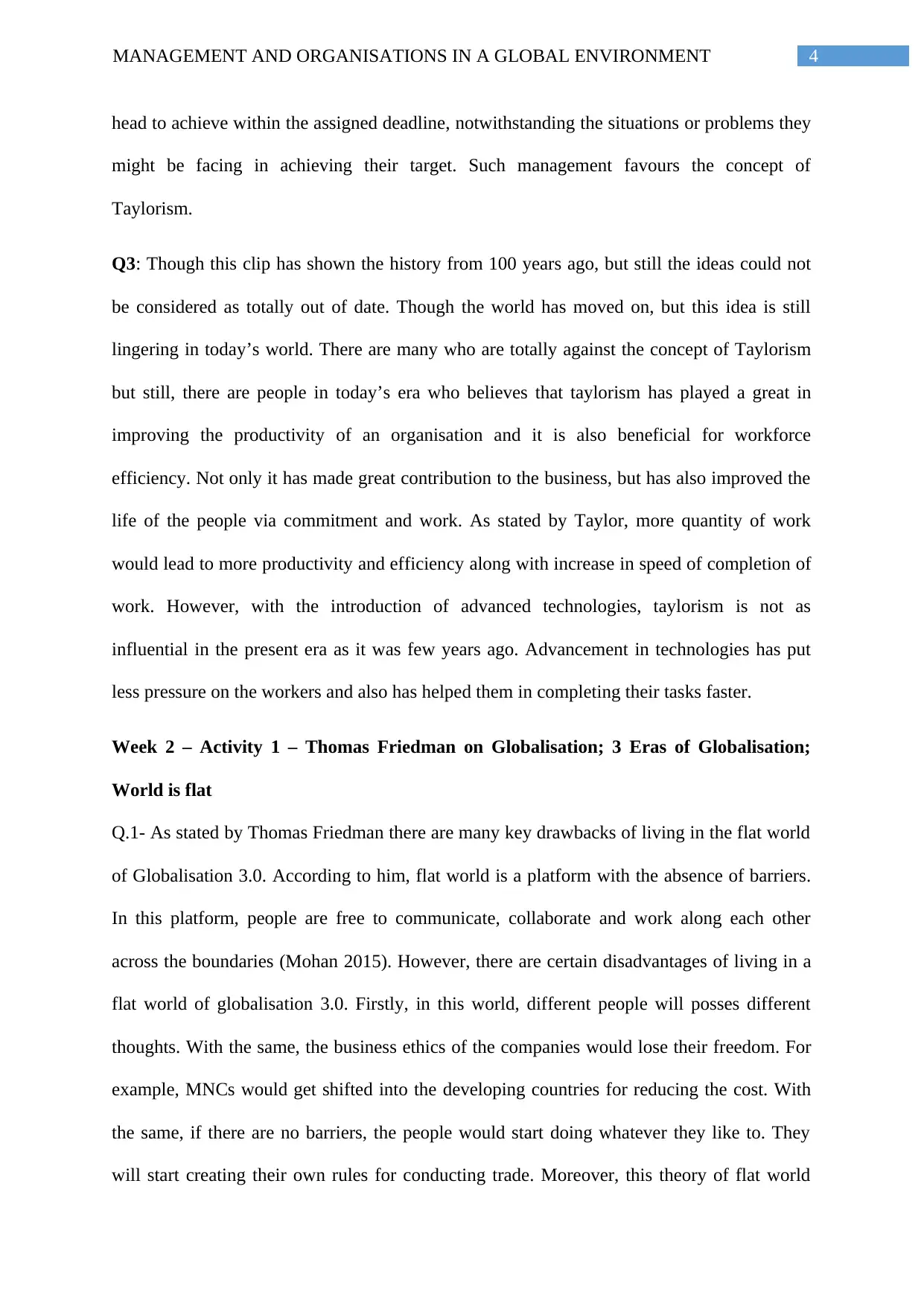
4MANAGEMENT AND ORGANISATIONS IN A GLOBAL ENVIRONMENT
head to achieve within the assigned deadline, notwithstanding the situations or problems they
might be facing in achieving their target. Such management favours the concept of
Taylorism.
Q3: Though this clip has shown the history from 100 years ago, but still the ideas could not
be considered as totally out of date. Though the world has moved on, but this idea is still
lingering in today’s world. There are many who are totally against the concept of Taylorism
but still, there are people in today’s era who believes that taylorism has played a great in
improving the productivity of an organisation and it is also beneficial for workforce
efficiency. Not only it has made great contribution to the business, but has also improved the
life of the people via commitment and work. As stated by Taylor, more quantity of work
would lead to more productivity and efficiency along with increase in speed of completion of
work. However, with the introduction of advanced technologies, taylorism is not as
influential in the present era as it was few years ago. Advancement in technologies has put
less pressure on the workers and also has helped them in completing their tasks faster.
Week 2 – Activity 1 – Thomas Friedman on Globalisation; 3 Eras of Globalisation;
World is flat
Q.1- As stated by Thomas Friedman there are many key drawbacks of living in the flat world
of Globalisation 3.0. According to him, flat world is a platform with the absence of barriers.
In this platform, people are free to communicate, collaborate and work along each other
across the boundaries (Mohan 2015). However, there are certain disadvantages of living in a
flat world of globalisation 3.0. Firstly, in this world, different people will posses different
thoughts. With the same, the business ethics of the companies would lose their freedom. For
example, MNCs would get shifted into the developing countries for reducing the cost. With
the same, if there are no barriers, the people would start doing whatever they like to. They
will start creating their own rules for conducting trade. Moreover, this theory of flat world
head to achieve within the assigned deadline, notwithstanding the situations or problems they
might be facing in achieving their target. Such management favours the concept of
Taylorism.
Q3: Though this clip has shown the history from 100 years ago, but still the ideas could not
be considered as totally out of date. Though the world has moved on, but this idea is still
lingering in today’s world. There are many who are totally against the concept of Taylorism
but still, there are people in today’s era who believes that taylorism has played a great in
improving the productivity of an organisation and it is also beneficial for workforce
efficiency. Not only it has made great contribution to the business, but has also improved the
life of the people via commitment and work. As stated by Taylor, more quantity of work
would lead to more productivity and efficiency along with increase in speed of completion of
work. However, with the introduction of advanced technologies, taylorism is not as
influential in the present era as it was few years ago. Advancement in technologies has put
less pressure on the workers and also has helped them in completing their tasks faster.
Week 2 – Activity 1 – Thomas Friedman on Globalisation; 3 Eras of Globalisation;
World is flat
Q.1- As stated by Thomas Friedman there are many key drawbacks of living in the flat world
of Globalisation 3.0. According to him, flat world is a platform with the absence of barriers.
In this platform, people are free to communicate, collaborate and work along each other
across the boundaries (Mohan 2015). However, there are certain disadvantages of living in a
flat world of globalisation 3.0. Firstly, in this world, different people will posses different
thoughts. With the same, the business ethics of the companies would lose their freedom. For
example, MNCs would get shifted into the developing countries for reducing the cost. With
the same, if there are no barriers, the people would start doing whatever they like to. They
will start creating their own rules for conducting trade. Moreover, this theory of flat world
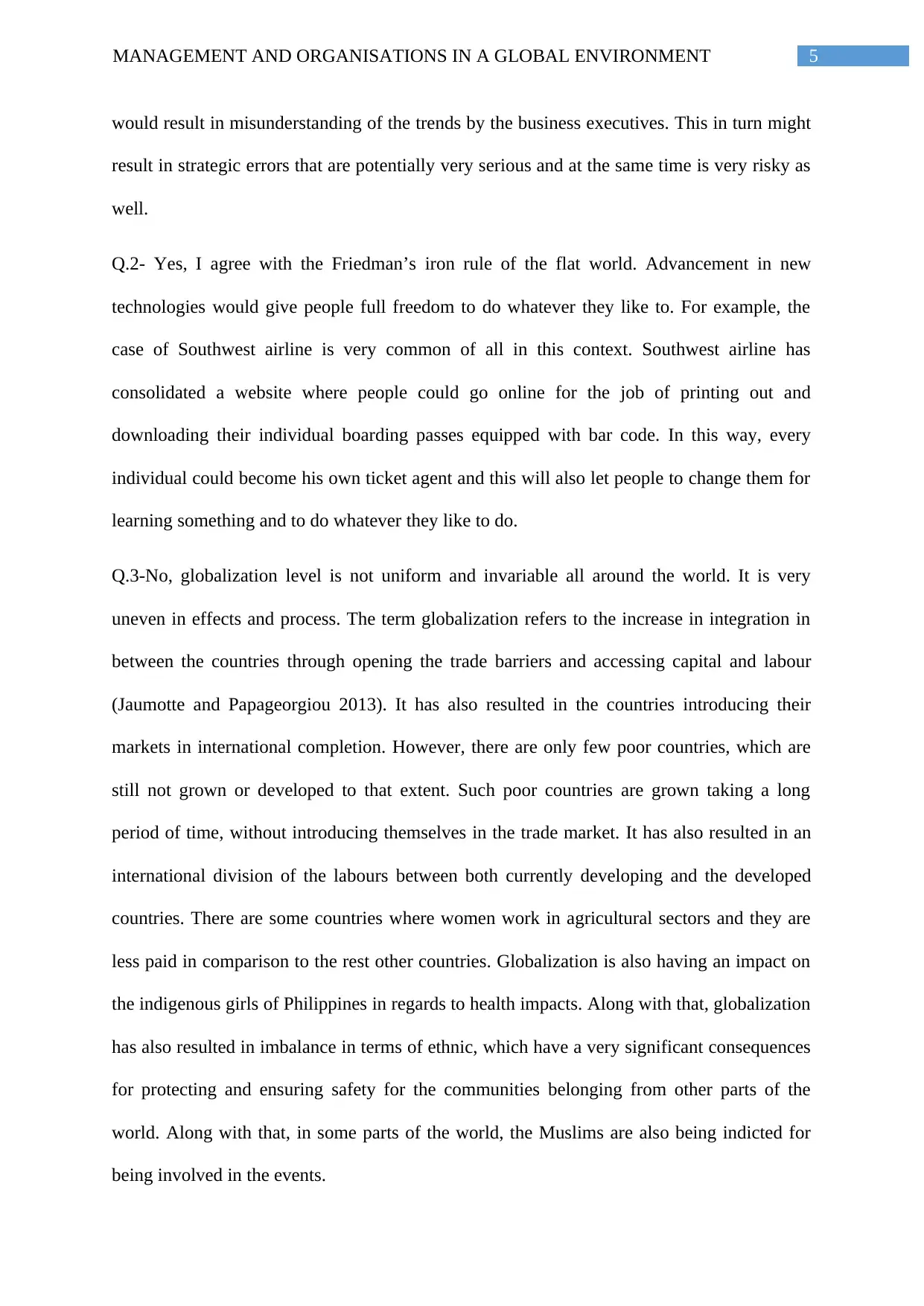
5MANAGEMENT AND ORGANISATIONS IN A GLOBAL ENVIRONMENT
would result in misunderstanding of the trends by the business executives. This in turn might
result in strategic errors that are potentially very serious and at the same time is very risky as
well.
Q.2- Yes, I agree with the Friedman’s iron rule of the flat world. Advancement in new
technologies would give people full freedom to do whatever they like to. For example, the
case of Southwest airline is very common of all in this context. Southwest airline has
consolidated a website where people could go online for the job of printing out and
downloading their individual boarding passes equipped with bar code. In this way, every
individual could become his own ticket agent and this will also let people to change them for
learning something and to do whatever they like to do.
Q.3-No, globalization level is not uniform and invariable all around the world. It is very
uneven in effects and process. The term globalization refers to the increase in integration in
between the countries through opening the trade barriers and accessing capital and labour
(Jaumotte and Papageorgiou 2013). It has also resulted in the countries introducing their
markets in international completion. However, there are only few poor countries, which are
still not grown or developed to that extent. Such poor countries are grown taking a long
period of time, without introducing themselves in the trade market. It has also resulted in an
international division of the labours between both currently developing and the developed
countries. There are some countries where women work in agricultural sectors and they are
less paid in comparison to the rest other countries. Globalization is also having an impact on
the indigenous girls of Philippines in regards to health impacts. Along with that, globalization
has also resulted in imbalance in terms of ethnic, which have a very significant consequences
for protecting and ensuring safety for the communities belonging from other parts of the
world. Along with that, in some parts of the world, the Muslims are also being indicted for
being involved in the events.
would result in misunderstanding of the trends by the business executives. This in turn might
result in strategic errors that are potentially very serious and at the same time is very risky as
well.
Q.2- Yes, I agree with the Friedman’s iron rule of the flat world. Advancement in new
technologies would give people full freedom to do whatever they like to. For example, the
case of Southwest airline is very common of all in this context. Southwest airline has
consolidated a website where people could go online for the job of printing out and
downloading their individual boarding passes equipped with bar code. In this way, every
individual could become his own ticket agent and this will also let people to change them for
learning something and to do whatever they like to do.
Q.3-No, globalization level is not uniform and invariable all around the world. It is very
uneven in effects and process. The term globalization refers to the increase in integration in
between the countries through opening the trade barriers and accessing capital and labour
(Jaumotte and Papageorgiou 2013). It has also resulted in the countries introducing their
markets in international completion. However, there are only few poor countries, which are
still not grown or developed to that extent. Such poor countries are grown taking a long
period of time, without introducing themselves in the trade market. It has also resulted in an
international division of the labours between both currently developing and the developed
countries. There are some countries where women work in agricultural sectors and they are
less paid in comparison to the rest other countries. Globalization is also having an impact on
the indigenous girls of Philippines in regards to health impacts. Along with that, globalization
has also resulted in imbalance in terms of ethnic, which have a very significant consequences
for protecting and ensuring safety for the communities belonging from other parts of the
world. Along with that, in some parts of the world, the Muslims are also being indicted for
being involved in the events.
⊘ This is a preview!⊘
Do you want full access?
Subscribe today to unlock all pages.

Trusted by 1+ million students worldwide

6MANAGEMENT AND ORGANISATIONS IN A GLOBAL ENVIRONMENT
Conclusion
To sum up, this paper has the paper has thoroughly shed light on the concept of
Taylorism through a systematic answering of the questions related to the video ‘Ford and
Taylorism’. It is concisely shed light on Friedman’s perception towards globalization that is
growing with a fast pace in today’s world.
Conclusion
To sum up, this paper has the paper has thoroughly shed light on the concept of
Taylorism through a systematic answering of the questions related to the video ‘Ford and
Taylorism’. It is concisely shed light on Friedman’s perception towards globalization that is
growing with a fast pace in today’s world.
Paraphrase This Document
Need a fresh take? Get an instant paraphrase of this document with our AI Paraphraser
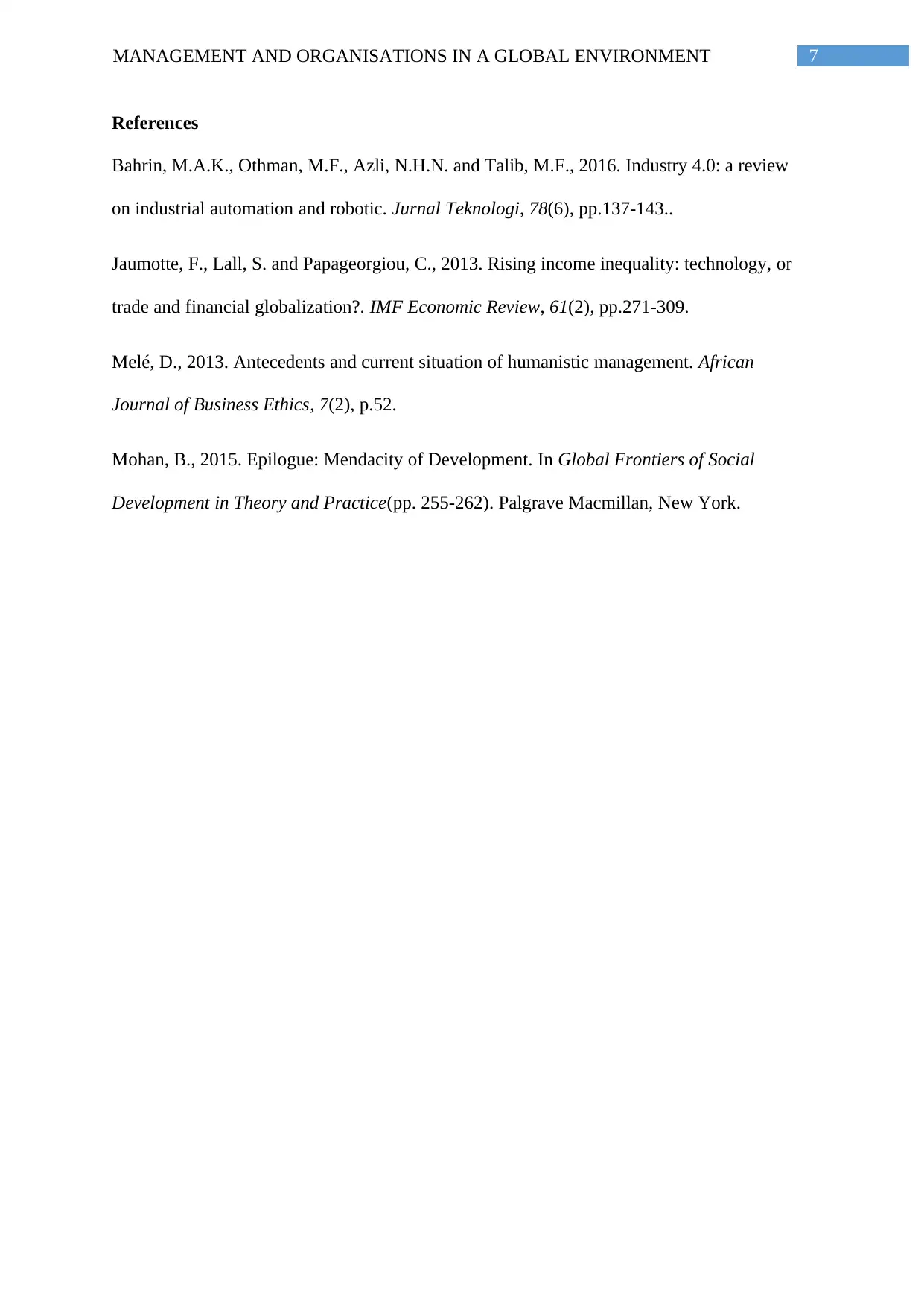
7MANAGEMENT AND ORGANISATIONS IN A GLOBAL ENVIRONMENT
References
Bahrin, M.A.K., Othman, M.F., Azli, N.H.N. and Talib, M.F., 2016. Industry 4.0: a review
on industrial automation and robotic. Jurnal Teknologi, 78(6), pp.137-143..
Jaumotte, F., Lall, S. and Papageorgiou, C., 2013. Rising income inequality: technology, or
trade and financial globalization?. IMF Economic Review, 61(2), pp.271-309.
Melé, D., 2013. Antecedents and current situation of humanistic management. African
Journal of Business Ethics, 7(2), p.52.
Mohan, B., 2015. Epilogue: Mendacity of Development. In Global Frontiers of Social
Development in Theory and Practice(pp. 255-262). Palgrave Macmillan, New York.
References
Bahrin, M.A.K., Othman, M.F., Azli, N.H.N. and Talib, M.F., 2016. Industry 4.0: a review
on industrial automation and robotic. Jurnal Teknologi, 78(6), pp.137-143..
Jaumotte, F., Lall, S. and Papageorgiou, C., 2013. Rising income inequality: technology, or
trade and financial globalization?. IMF Economic Review, 61(2), pp.271-309.
Melé, D., 2013. Antecedents and current situation of humanistic management. African
Journal of Business Ethics, 7(2), p.52.
Mohan, B., 2015. Epilogue: Mendacity of Development. In Global Frontiers of Social
Development in Theory and Practice(pp. 255-262). Palgrave Macmillan, New York.
1 out of 8
Related Documents
Your All-in-One AI-Powered Toolkit for Academic Success.
+13062052269
info@desklib.com
Available 24*7 on WhatsApp / Email
![[object Object]](/_next/static/media/star-bottom.7253800d.svg)
Unlock your academic potential
Copyright © 2020–2026 A2Z Services. All Rights Reserved. Developed and managed by ZUCOL.



